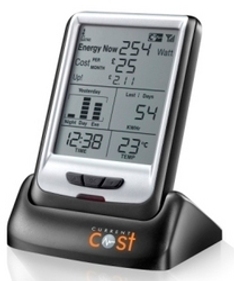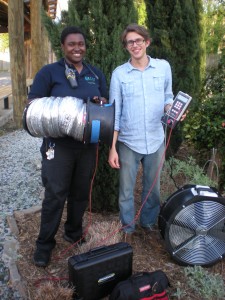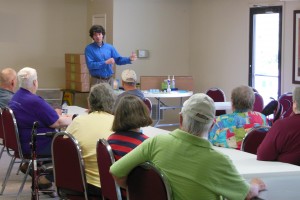Roxanne Li is serving with the Commission on Economic Opportunity in Pennsylvania. She shared some of the work she has done on the Weatherization Innovation Pilot Program.
Say you’re a homeowner struggling to pay his/her bills each month, and someone tells you that you’re eligible for a free Home Energy Monitor (HEM)- a device that shows you exactly how much power your house is consuming at any given point in time, and how this power might translate into your energy bill. Would you eagerly snatch it up and start turning appliances on and off around the home to see where you could save the most on electricity? Or would it merely sit on your kitchen counter and gradually fade into the background as you continue with your every day routine?

At the Commission on Economic Opportunity, we’re handing out these devices as part of the Weatherization Innovation Pilot Program to see if having a visual reminder of their home’s energy consumption will help our clients save on their electricity bills.
Every day, we visit our client’s homes, install the device, and sit with them for a one-on-one session on how they can go about saving electricity by tweaking their daily routines. One of my goals as an Energy Educator is to prevent the device from disappearing into the anonymity of household clutter by reminding them how they can use it to make energy saving choices such as washing clothes in cold water, minimizing the use of space heaters and turning off and unplugging appliances that aren’t in use. If used correctly, it has the potential to empower clients with a new level of energy conscientiousness that’s just not possible with a once-a-month energy bill.
Some clients have been incredibly enthusiastic and receptive to the idea, while with others you get the feeling that they’ll unplug it as soon as you walk out the door. It’s all part of the experimental process, and as the Energy Educator, you have to accept it and move on.
As a stickler for energy conservation, I’ve enjoyed the opportunity to talk with all sorts of people about what they’ve done, are doing, and will do to conserve energy. I’ve learned a lot of useful tidbits about energy-efficiency in homes, and I’ve been polishing my persuasion skills (“Pleaaaase take this HEM it is so cool!”). In all seriousness though, it’s been a fun month and a half as an Energy Educator, and I’m looking forward to where this experience will take me next.
 Roxanne Li graduated from Cornell University in May 2012 with a B.S. in Environmental Engineering and a minor in Sustainable Energy Systems. She then went on to complete a six month internship with an environmental consulting company in Johannesburg, South Africa. Roxanne will be working on the Weatherization Innovation Pilot Project at the Commission of Economic Opportunity (CEO) in Wilkes-Barre, PA. She will provide energy education for low-income households and develop strategies to overcome barriers related to behavior changes that could reduce residential energy consumption.
Roxanne Li graduated from Cornell University in May 2012 with a B.S. in Environmental Engineering and a minor in Sustainable Energy Systems. She then went on to complete a six month internship with an environmental consulting company in Johannesburg, South Africa. Roxanne will be working on the Weatherization Innovation Pilot Project at the Commission of Economic Opportunity (CEO) in Wilkes-Barre, PA. She will provide energy education for low-income households and develop strategies to overcome barriers related to behavior changes that could reduce residential energy consumption.








